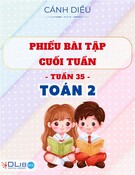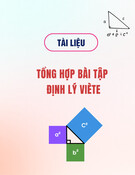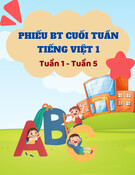
TRƯỜNG THCS LƯƠNG THẾ VINH
1
GRADE 8- REVISION FOR THE FIRST TERM TEST
I. USE OF ENGLISH
A. CHOOSE THE WORD WHOSE UNDERLINED PART IS PRONOUNCED
DIFFERENTLY FROM THAT OF THE OTHERS.
1. A. cultural B. documentary C. rice D. ethnic
2. A. pray B. admire C. contestant D. decorative
3. A. community B. custom C. costume D. museum
4. A. children B. choose C. child D. mechanic
5. A. cousin B. interesting C. link D. fond
B. VOCABULARY
1. Khmer men teach their children how to ______ fish at an early age.
A. milk B. catch C. raise D. herd
2. The elders often pass on their ______ to the young through stories and activities.
A. traditions B. rules C. legends D. music
3. The mountain people in the Central Highlands use natural ______ to build a Rong house.
A. trees B. posts C. leaves D. materials
4. The kids are excited to ______ the Christmas tree with colorful balls and ribbons.
A. provide B. decorate C. organize D. beautify
5. ______ such as kumquat trees, peach blossoms, and apricot flowers are popular at Tet.
A. Blooming flowers B. Vegetables C. Ornamental trees D. Fruit
8. Traditionally, the ______ in a village is a place for villagers to meet or worship.
A. festival B. market C. communal house D. ceremony
9. Festival ______ wore colorful costumes and danced in the streets.
A. goers B. poles C. habits D. people
10. She trained her huskies to pull a ______ across the snow.
A. dogsled B. lifestyle C. store D. tribe
C. PREPOSITIONS
1. They hang decorative items on a bamboo pole to chase ______________ bad luck.
2. We broke _____________ tradition by travelling abroad on the first day of Tet.
3. They often dress _____________ for the Moon God offering ceremony.
4. The festival only lasted for three days; however, they spent nearly a month preparing
_____________ it.
5. The Viet or King has the largest number of people, accounting _____________ about 86% of the
population.
D. CONVERSATION
1. - Tuan: “You should avoid negative topics like deaths or funerals during Tet.” - Ann: “______”
A. Sure. I'll say that. B. I'll remember that. C. It doesn't matter. D. That would be nice.
2. - Mom: “Don't play with chopsticks when you are at a meal table.” - Son: “______”

TRƯỜNG THCS LƯƠNG THẾ VINH
2
A. OK, I won't. B. I'm afraid I can't. C. That's a good idea. D. Sure. I'll do it.
3. - Mark: “What a lovely garden you have!” - Lacy: “______”
A. I'm glad you like it. B. Sure, go ahead. C. I'd love to. Thanks. D. That's a great idea.
4. - Rudy: “Can I borrow your notes from yesterday's class?” - Vivian: “______.”
A. Certainly. B. I think so. C. Yes, you can. D. That's true.
5. Sam: “Could you help me move next weekend?”
Tony: “______. What time should I come over?”
A. Sure, go ahead. B. Of course. C. I'm afraid not. D. Great idea.
E. VERBS OF LIKING/ DISLIKING
1. Does she fancy ______ a book to the younger children?
A. read B. reading C. to read D. B&C are correct
2. They love _______ out with their friends.
A. eating B. to eat C. eat D. A&B are correct
3. John was keen on ______ cartoons.
A. watching B. to watch C. watch D. watched
4. Our kids are _______ in playing with pets when they have free time.
A. interested B. fond C. crazy D. keen
5. My son didn’t _____ playing football when he was young.
A. crazy about B. liked C. fond of D. adore
F. COMPARATIVES OF ADVERBS
1. Julia plays the guitar _________ than Anna does.
A. well B. more well C. better D. as good as
2. Today I got up ________ than I did yesterday.
A. earlier B. more early C. most early D. early
3. The wind is blowing _______ than it did last night.
A. stronger B. more strongly C. strongly D. strong
4. It rained ________ today than it did yesterday.
A. more heavy B. heavier C. more heavily D. heavily
5. My sister dances ________ than me.
A. more beautiful B. more beautifully C. beautifully D. beautiful
G. CONJUNCTIONS
1. Lan wants to join the school music club, _______ she can’t sing or play any instruments.
A. but B. however C. so D. therefore
2. You can go to the city centre by bus ______ you can go there by train.
A. because B. or C. and D. yet
3. Fred came to school late, he overslept.
A. for B. or C. and D. but
4. Laura has to finish her homework; ________, she can’t go out with her friends.

TRƯỜNG THCS LƯƠNG THẾ VINH
3
A. but B. however C. therefore D. otherwise
5. It was raining heavily; ________, he continued planting trees in the garden.
A. therefore B. however C. but D. or
F. QUESTIONS
1. ________ do you play tennis? – For excercise.
A. Which B. Who C. Why D. How
2. ________ can I buy some milk? – At the supermarket.
A. Which B. Who C. Where D. How
3. ________ much do you weigh?
A. Which B. Who C. What D. How
4. ________ hat is this? – It’s my brother’s.
A. Which B. Whose C. What D. How
5. ________ do the ethnic children walk from their village to the town? – Everyday.
A. Which B. Who C. Where D. How often
6. How ________ you get here? – I came here by train.
A. do B. did C. wiere D. are
7. What ________ you do during the trip to the countryside this weekend?
A. do B. did C. were D. will
8. How many ethnic groups ________ there in Vietnam?
A. do B. are C. was D. is
9. How ________ they celebrate Lim festival?
A. do B. are C. were D. does
10. Why ________ she collecting photos of flowers on the Internet? – Just for fun.
A. does B. are C. was D. is
F. ARTICLES
1. Thank you. That was ______ very nice lunch.
A. a B. an C. x D. the
2. Mark Twain, _____ American writer, wrote “Life in the Mississippi River”.
A. an B. a C. the D. x
3. _____ youngest boy has just started going to _____ school.
A. a - x B. x - the C. an – x D. the – x
4. Please turn off ______ lights when you leave ______ room.
A. the – the B. a – a C. a – the D. the - a
5. ______ Netherlands has a long coastline with beautiful beaches.
A. A B. An C. X D. The
G. COUNTABLE AND UNCOUNTABLE NOUNS
1. My mother puts some milk and two ______ in my schoolbag.
A. orange juice B. jam C. apples D. sugar

TRƯỜNG THCS LƯƠNG THẾ VINH
4
2. How much ______ is there in the bottle?
A. bananas B. bread C. water D. beans
3. We are going to cook Vietnamese food including ______ and ______.
A. fried rices / beef noodle soup B. fried rice / beef noodle soups
C. fried rice/ beef noodle soup D. fried rices / beef noodle soups
4. How ______ times a day do you brush your ______?
A. many- tooth B. many – teeth C. much – teeth D. much – tooths
5. How ______ ethnic groups in Viet Nam do you know?
A. much B. often C. many D. tall
H. ERROR
1. We don’t need too much sugars. There’s still a packet in the cupboard.
2. My son started to play the baseball when he was ten.
3. According for tradition, the first person to enter the house on New Year’s Eve brings either good
luck or bad luck.
4. At weekends my friend and I often go fishing and spending time at the park if it is fine.
5. Kim will definitely tells you all about her trip to Europe when she gets back.
K. WHAT DOES THE TEXT SAY?
A. You can’t drive this way.
B. Traffic is stuck today.
C. Everyone can drive following this way.
D. You can park here.
A. Students should pay less money to visit here
B. Students do not have to pay to go here at
weekends
C. You can find things to listen to here in the
college.
A. Someone would like to speak another
language.
B. If you study Spanish, you have to go in the
evenings.
C. You can take part in this class this weekend.
A. You can find things to listen to here in the
college.
B. Everyone can find anything in the library.
C. Students can borrow Math books here.
A. If you are students, you can pay less for this.
B. If you are over 20 years old, you have to pay
less for this.

TRƯỜNG THCS LƯƠNG THẾ VINH
5
C. If you are below 10 years old, you are free.
II. READING
A. Read and CIRCLE the item among A, B, C or D that best answers about the passage
The lifestyle in Bangkok is quite different. I think that living in Bangkok is very exciting. I haven’t
lived here all my life. My family came here when I was three. But now it is my home. Nearly all my
friends live here. It is our capital city, and very big. From morning till night there are crowds of people
on the main streets. Some parts of the city are very noisy. I have a long journey to school every day,
but I don’t mind because it is so interesting. There’s always something happening in the streets. There
are all kinds of people selling things – fruits, flowers, cooked food, clothes - everything you could
imagine. I really enjoy the excitement of the crowded streets and large modern buildings. I love
walking around the streets at the weekend with some other boys from my class.
1. When did the writer move to Bangkok?
A. When he was three months old B. At the age of three
C. When he was in grade three D. At the age of thirteen
2. What does the word “main” in the paragraph mean?
A. quiet B. minor C. major D. clean
3. Why doesn’t the writer mind the long journey to his school?
A. Because he travels by bus
B. Because he can see many interesting things in the streets
C. Because he selling fruits
D. Because he can enjoy cooked food
4. Which of the following sentences is NOT true?
A. The writer was born in Bangkok B. Bangkok is the capital city of Thailand
C. The writer’s house is very far from his school
D. Almost streets in Bangkok are crowded and busy
5. Who does the writer walk around the streets at weekends with?
A. His sister B. His brother C. His cousin D. His classmates
B. Read and CIRCLE the item among A, B, C or D that best answers about the passage
The country is more beautiful than a town and more pleasant to live in. Many people think so, and
go to the country for the summer holidays though they cannot live there all the year round. Some have
a cottage built in a village so that they can go there whenever they can find the time. English villages
are not all alike, but in some ways they are not very different form one another. Almost every village
has a church, the round and square tower of which can be seen from many miles around. Surrounding
the church is the churchyard, where people are buried. The village green is a wide stretch of grass, the
houses or cottages are built round it. Country life is now fairy comfortable and many villages have
running water brought through pipes into each house. Most villages are so close to some small towns
that people can go there to buy what they can’t find in the village shops.
1. When do city people often go the country?





![Bài tập so sánh hơn và so sánh nhất của tính từ [kèm đáp án/mới nhất]](https://cdn.tailieu.vn/images/document/thumbnail/2025/20250808/nhatlinhluong27@gmail.com/135x160/77671754900604.jpg)
![Tài liệu tham khảo Tiếng Anh lớp 8 [mới nhất/hay nhất/chuẩn nhất]](https://cdn.tailieu.vn/images/document/thumbnail/2025/20250806/anhvan.knndl.htc@gmail.com/135x160/54311754535084.jpg)




![Tài liệu Lý thuyết và Bài tập Tiếng Anh lớp 6 [Mới nhất]](https://cdn.tailieu.vn/images/document/thumbnail/2025/20250802/hoihoangdang@gmail.com/135x160/18041754292798.jpg)




